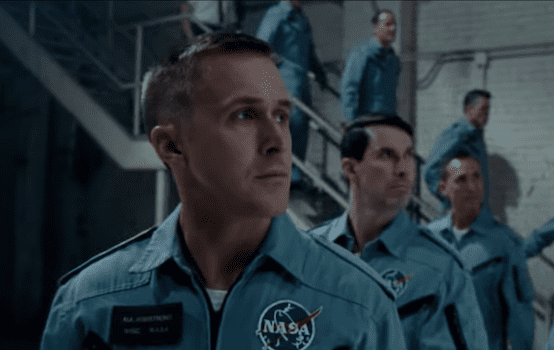First Man: STEM Gets the Humanities Treatment

So you’re a young, Oscar-winning director responsible for two of the most engrossing music-themed dramas in recent memory. What’s your next project? “A historical thriller about humankind’s first trip to the moon” probably wouldn’t be the first thing that comes to mind—but Damien Chazelle’s latest film, First Man, is exactly that. And what’s more, it succeeds spectacularly.
First Man—chronologically situated between 1983’s The Right Stuff and 1995’s Apollo 13—fills a niche in Hollywood’s canon of space exploration films. It follows Neil Armstrong (Ryan Gosling) through the early years of America’s space program all the way to his fateful Apollo 11 mission in 1969. We travel alongside Armstrong through his early flights in supersonic jets on the very edges of Earth’s atmosphere, the first successful docking of a spacecraft in orbit, and, of course, the moon landing itself.
Despite its nearly two-and-a-half-hour runtime, First Man is a surprisingly spare film. Famous figures like Buzz Aldrin (Corey Stoll) are largely relegated to the sidelines, with little to do other than announce their names and accompany Armstrong on his flights. And as in Whiplash and La La Land, there’s very little exposition or historical contextualization here—which works to the movie’s great credit. There are no ham-handed statements about the 1960s or nationalism or militarism: instead, Chazelle remains laser-focused on his protagonist and on the visceral experience of spaceflight. (With that said, I feel compelled to point out that despite all the Twitter brouhaha, we do indeed see the American flag planted on the moon.) Suffice it to say that Chazelle’s minimalist filmmaking approach works beautifully, and I wish more directors of period pieces would follow suit.
As well crafted as it is, though, First Man may not please all viewers. Chazelle’s films have never been crafted for maximum mainstream appeal, and this one is no exception. It relies heavily on its bruisingly intense, shaky-cam flight scenes, and it persistently refuses to follow the plot beats common to most biopics. What’s more, through it all, the movie’s central figure remains an enigma—Gosling has little to do other than display his chiseled visage.
To some extent, that’s precisely the point. Armstrong doesn’t quite know how to be a good husband to his faithful wife (Claire Foy) or a father engaged in the lives of his young sons. Instead, he’s haunted by twin specters: the childhood passing (by cancer) of his daughter Karen, and the inevitably climbing death toll of the space program.
First Man’s willingness to confront the latter is what makes it such a ferociously intense cinematic experience. The film’s spacecraft are never depicted as majestic accomplishments of human ingenuity, but as rickety deathtraps perpetually teetering on the edge of disintegration. Twice, the camera follows Armstrong as he slowly—or rather solemnly—makes his way up to the cockpit. We witness the grave faces of the scientists surrounding him as the vessel’s door looms open like a yawning mouth. And once he’s strapped in, we’re thrown headlong into thundering, spinning, stomach-churning ascents into orbit (if you experience motion sickness, this is not the movie for you). Think Gravity, but more menacing.
But First Man is far more than an adrenaline rush or a sober look at past tragedies. As I was leaving the theater, a curious thought struck me: First Man is the sort of film that comes into being when creators steeped in the humanities turn their attention to traditional STEM subjects. Not once does the film feel like an extended commercial for programming boot camps or NASA summer internships (as it very well might have in another director’s hands). Rather, it shows an ethos that’s radically different from the swaggering scientistic triumphalism of Independence Day, The Martian, and others in the genre. Such films, all too often, portray the natural world as something that must be corralled, tamed, or beaten into submission through the strength of human ingenuity.
To be sure, this temptation is nothing new. Martin Heidegger wrote in 1954 that, for modern man, “[e]verything depends on our manipulating technology in the proper manner as a means. …The will to mastery becomes all the more urgent the more technology threatens to slip from human control.” And where, after all, is human control so limited as in outer space?
At the heart of First Man, though, is a very different set of emotions: fear, love, and pure awe before the spectacular vistas of creation. Nowhere is this more powerfully realized than in the film’s long, slow approach to the lunar surface. As we’re enveloped in Justin Hurwitz’s haunting musical score, we’re faced with the sheer beautiful unfamiliarity of something we’ve generally come to take for granted. We glimpse shadows, gorges, flashes of sunlight, the Earth’s blue curve, and much more. A narrative we know by heart becomes something truly stirring.
In earlier times, the deployment of human proficiency and creativity was not conceived as raw subjugation, but rather as illumination of the world that was already given. As Heidegger puts it, “There was a time when it was not technology alone that bore the name technē. …[A]rt was simply called technē. It was a single, manifold revealing…the safekeeping of truth.” First Man, to its core, reflects that older sense of technē.
And that, above and beyond everything else, is a truly remarkable achievement.
John Ehrett is executive editor of Conciliar Post and a graduate of Yale Law School.
Comments